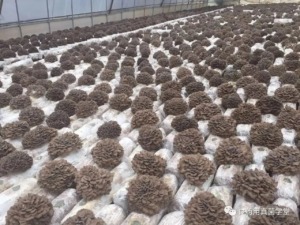General Details
Product name: Maitake extract
Plant latin name: Grifola frondosa
Product specifications: Polysaccharides ≥30% by UV
Appearance: Brown powder
Maitake extract is extracted from Grifola frondosa fruiting bodies. Maitake (Grifola frondosa) polysaccharides are a group of active ingredients that can improve immunity and prevent and cure cancer. It is an additive raw material for various health products and foods.
Maitake (Grifola frondosa) polysaccharides are mainly glucan, and the basic structure is β-(1→3) glucan with β-(1→6) branches, which also contains a small amount of xylose and mannose.
Health Benefits
The research results show that maitake polysaccharides mainly exert their anti-tumor effect by enhancing cellular immune function. This product has a strong anti-chemical mutagenesis effect at the gene level and can be used for chronic hepatitis B and malignant tumors after radiotherapy and chemotherapy. Comprehensive treatment of fatigue, leukopenia, and decreased immune function has a specific effect on preventing AIDS. Maitake polysaccharides are clinically effective, safe, and non-toxic.
Maitake polysaccharides have anti-tumor, anti-hypertension, lowering blood sugar, anti-obesity, and anti-hepatitis effects. According to clinical experiments in some specialized cancer treatment hospitals in the United States, using maitake polysaccharides to inhibit cancer cells is more effective than chemotherapy alone when treating cancer with chemotherapy. Japanese medical experts used maitake polysaccharides to conduct anti-tumor in vivo experiments. The results showed that the inhibition rate of maitake polysaccharides could reach 86.5%.
As early as 1992, the National Cancer Institute of the United States confirmed that the extract of maitake has the effect of resisting HIV. In addition to its anti-HIV effect, maitake is also effective against breast cancer, lung cancer, and liver cancer; it can also improve various adverse reactions caused by chemotherapy of tumors, such as loss of appetite, vomiting, nausea, hair loss, and leukopenia, etc.; also relieve pain. In addition, studies have also confirmed that maitake has the following effects at the same time: (1) reduces insulin resistance, enhances the body’s sensitivity to insulin, and helps control blood sugar; (2) inhibits the accumulation of fat cells; (3) lower blood pressure; (4) Enhance immunity.
Maitake helps to prevent and resist discomfort caused by colds and flu because of its antibacterial properties by enhancing the immune system, maintaining anti-toxicity of liver and kidney function, helping the recovery of diseases, helping the body to cope with environmental stress conditioning, immune regulation It is known for its ability to enhance conventional anticancer efficacy, fight neutropenia and improve survival.
Strengthen the immune system
Polysaccharides stimulate T-cell function, natural killer (NK) cell, and macrophage activity. T-cells are white blood cells that can “phagocytose” pathogens such as yeast cells, bacteria, viruses infected with viruses, and the like. Macrophages are concentrated in the mucous layers of the body – especially in the digestive, urinary and respiratory systems. Polysaccharides also strengthen the reticuloendothelial system, the tissue where immune cells (including macrophages) penetrate the spleen, liver, and lymphoid tissues and engulf waste and toxic waste chemicals.
Anti-cancer
Maitake polysaccharides such as macrophages, natural killer cells, T-lymphocytes, lymphokines, and interleukins activate immune responses. These properties make it useful in the treatment of cancer. Studies have shown that it can reduce the side effects of chemotherapy, and animal experiments have also shown that maitake can shrink tumors. In one study, compared to other previously tested natural substances. Maitake is the most potent inducer of apoptosis (cell death) in cancer cells.
Lower blood pressure, cholesterol, and arteriosclerosis
The active ingredients in maitake polysaccharides, such as beta (1-3) D-glucan and beta (1-6) D-glucan protein compounds, have the positive effect of reducing blood glucose (sugar).
